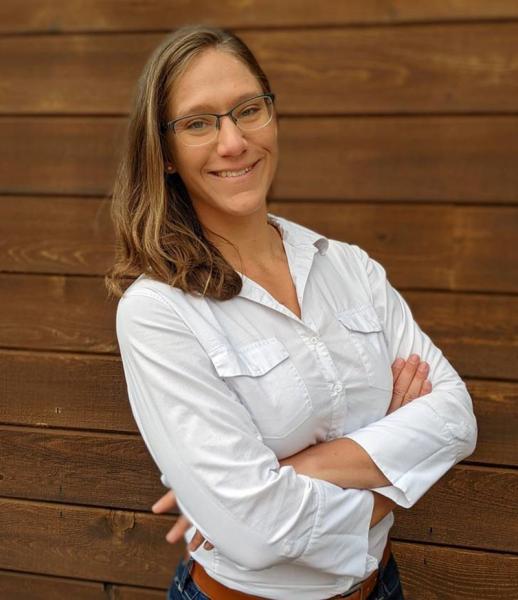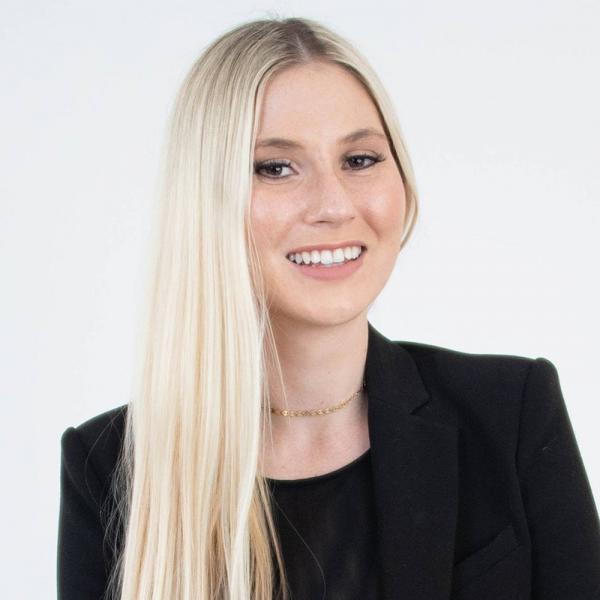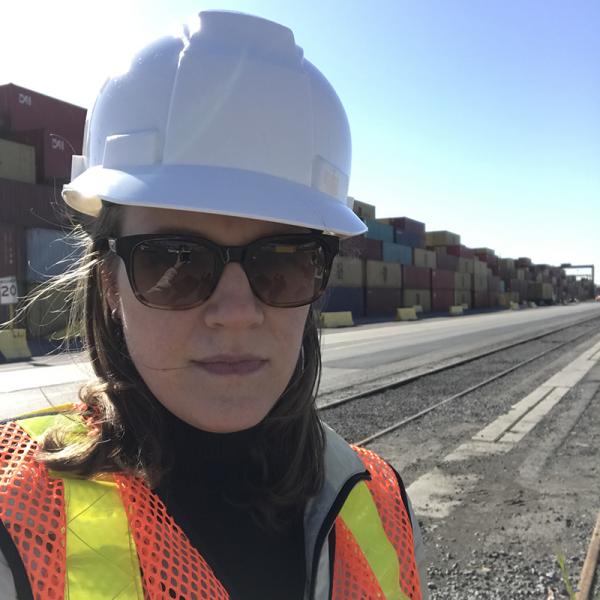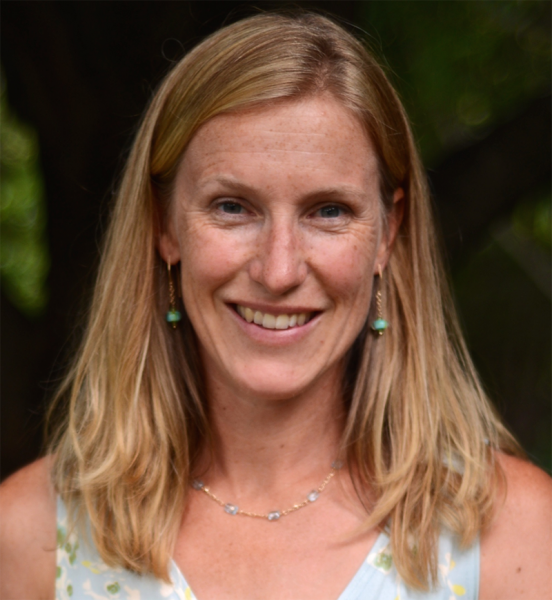
The Port of Seattle is celebrating Women’s History Month by recognizing and honoring women who are leading and innovating in traditionally male-dominated industries.
According to the International Maritime Organization, women represent just two percent of the world’s 1.2 million seafarers. We sat down with five inspiring female maritime entrepreneurs from the second wave of the Maritime Innovation Accelerator who are taking the industry by storm.
The Accelerator was launched by Maritime Blue, a statewide organization of maritime stakeholders, the state Department of Commerce, and the Port of Seattle to spur new technology and investment in one of Washington’s most enduring and important industry sectors.
We learned about the founders’ passions and motivations to solve problems in the world’s oldest industry, and how their innovations and leadership are creating efficiency, spurring innovation, finding an easier and more effective way to work, and even saving the planet.
Lindsay Hennes
Cofounder, Mariner Credential Service

As a “biologist turned boat captain turned data scientist turned software developer,” Lindsay Hennes’ strong sense of adventure and natural curiosity led her down several different career paths before she cofounded the startup, Mariner Credential Service, which leverages technology and a web app to streamline the complex mariner credentialing process. The start up’s web app, MM-SEAS, launches March 15.
Hennes was familiar with the long, confusing, and archaic process of getting her maritime credential as a ferry boat captain in San Francisco Bay and saw an opportunity to help the 200,000 mariners who are required to have the credential to keep working on the water.
“If you’d asked me a couple years ago, I might not have guessed that I’d be founding a startup,” Hennes said. “I hadn’t realized that you could just start a company. In my head I always thought I should get some more experience before I launched my own business, but through this opportunity I fast tracked to the end goal.”
As a ferry boat captain and now as a maritime entrepreneur, Hennes is no stranger to operating in a male-dominated industry.
“I don’t look like what someone’s mental image of a boat captain looks like,” she said. “It’s been motivating to see other women moving up the ranks in the industry. I think that if she can do it, I can do it.”
As a startup founder, Hennes appreciates having the chance to explore and build something that hasn’t been built before.
“l have become really comfortable with failing at things as part of the iterative process of building a good product. I am not the best software developer on our team. I am a boat captain that knows data science and can do some software development. The key is admitting that I could use some help and our team is more than happy to jump in. It’s a game of keep on learning new things, keep on building new things, keep on growing.”
Celeste Leroux
Founder and CEO, Virgil Group
Celeste Leroux’s journey to entrepreneurship started with a problem she was desperate to solve — she wanted to find an efficient way to verify that seafood has been legally sourced and meets regulatory traceability requirements. Leroux had previously spent over a decade working in the federal government on all aspects of ocean policy.
“I realized I could potentially have more of an impact if I were able to take my expertise and try to solve issues I had seen on the government side and try to solve them in the private sector,” she said. “I had no romantic desire to start a company, but it was necessary to solve a problem I saw in oceans. That's the thing I care most about.”
Today Leroux is founder and CEO of Virgil Group, which offers real world solutions through tools, policies, and partnerships helping buyers and sellers assess risk of potentially illegal seafood in their supply chains. They are currently working on developing software that can instantly verify the legality and traceability of seafood.
She said the process of starting a company has been amazing.
“If somebody told me that starting a company meant that you would basically take all the best people you’ve ever worked with and just work with them, and your clients are the people you have dreamed of working with your entire career, I probably would have started this at least a year earlier than I did. It’s been the coolest adventure.”
Leroux has learned you can be a leader at any stage of your career.
“I love being able to support my to team to help them realize change they didn’t think was possible. I love working with interns and I want to help them understand a broader world they can impact. I’m motivated to do well for my family, and by the ability to wake up in morning and choose my destiny each day.”
Lori-Lee Elliott
Founder and CEO, Future Sight AR
When Lori-Lee Elliott began working in Australia as a commissioning engineer for Bechtel, a multibillion-dollar construction company, she assumed the company would leverage technology in their processes. She was shocked to find that she was doing all her work with pen and paper. The longer she worked in the industry, the more she realized that every company in the industry operated in a similar way. Elliott was convinced there was a better way to work. She was passionate about creating systems that automate processes and allow people to be more creative and productive with their free time.
So Elliott joined product manager Sofia Lazaro on a quest to find a company that was using mixed reality and augmented reality tools to disrupt the way engineering and construction companies build infrastructure.
“We scoured the globe and found that nobody was doing that work,” she said.
So Elliott and Lazar brought in virtual and augmented reality software developer Veena Somareddy, and founded Future Sight AR, a 100 percent female-founded company.
In 2020, they launched Katana, a full software suite and application that allows users to create and assign mixed reality guides, step-by step-instructions, procedures, or checklists, and publish them to mixed reality, where it can be viewed on Android, IOS, and AI devices.
Elliott said her own company culture based on her own values was very important to her.
“We built an excellent product and we make sure its merit is at the forefront of everything. We also honor work-life balance. Since founding the company my cofounder and I have weddings, babies, and other life milestones. We have been able to take that time without feeling bad. I’m a whole person with a life, and I have these things and they are part of who I am and it doesn’t make me do my job any worse. It makes me do it better if anything.”
Whether it’s in a maritime, male-dominated industry or not, Elliott said it’s really challenging to start a company and succeed.
“My advice to women entrepreneurs is don’t be intimidated by that. Go ahead and do it, even though it’s difficult. The experience is invaluable and will lead you somewhere you never thought it would go. We need more women starting businesses.”
Jennifer Ivens
Founder and CEO, Canscan
When Jennifer Ivens started working as a trainer in the maritime transportation industry, she developed a behind-the-scenes understanding of how the shipping industry worked. With this perspective, Ivens saw areas that could be improved. She founded Canscan in 2018 as a way to tackle the problem that irritated her the most — the manual and inefficient process of inspecting millions of shipping containers coming into and through terminals.
Canscan developed a system, based on artificial intelligence, machine vision, and data analytics that uses existing cameras and infrastructure to automatically inspect containers transiting into or through a terminal. Looking back at her journey to starting her own company, Ivens said she had no idea how intense and challenging the process would be.
“I’m glad I didn’t know,” she said. “It’s easier to jump off a cliff and build an airplane on the way down when you don’t know what it looks like to splat at the bottom.”
Ivens said leading her team toward personal growth is her biggest motivating factor. She makes a point to hire junior employees who don’t necessarily have the background for a particular role but are passionate and willing to learn.
Ivens’ advice for other prospective female entrepreneurs in the maritime industry? Be confident.
“If you know what you are doing and you are bringing value to industry no one will care,” she said. “Most of the time people see will see the value you bring. When you walk into the board room don’t bat an eye, be assertive, look them in the eye, and they will respect you.”
She emphasized the importance of exposing women to careers in maritime and technology at an early age.
“We need a lot more inspiring, interactive show and tell opportunities to encourage young girls to learn about maritime, transportation, and coding,” she said. “We need to give them the opportunity to find out if they like it, and if they like it, encourage them to take it to the next level.”
Julie Hampden
Consultant for Earthwise Sorbents
When Julie Hampden moved to the Pacific Northwest to work as a naturalist and science teacher at the Olympic Park Institute and to attend the University of Washington’s School of Marine Affairs, she became fascinated with salmon as a cultural and regional symbol as well as an economic and ecological driver.
This interest led to a long career of creating solutions for complex environmental issues from a regulatory compliance perspective, focusing almost entirely on large infrastructure projects. It also turned her focus toward key issues like fish passage, ocean noise, ocean plastics, and ocean pollution.
“In my work I look at the balance between development and maintaining ecological integrity and sustainability,” she said.
This path led her to recent partnerships in the innovation space with Marine Construction Technologies, which engineers piling technology to address underwater noise, and Earthwise Sorbents, which reduces plastic pollution by recycling and repurposing foam and fabric waste into environmental clean-up products.
“I love working on issues that I care about. I’m passionate about creating teams of people to really bring their best selves to work. I think that’s essential.”
She thinks outside the box to tackle bottlenecks and problems in her industry. Hampden said working in a predominantly male industry, she’s learned to seek out other women mentors in that space and learn from and share experiences and ideas. She advises aspiring female entrepreneurs to reach out to people that intrigue them.
“Seek out allies to help you work through more difficult times and adopt a mindset where you are always learning. It’s important to keep an open mind and look for opportunities for collaboration.”
She said the Maritime Accelerator Program represents an interesting inflection point in the maritime industry and brings together different perspectives on ways to innovate and solve industry problems.
“There is such a huge potential for growth and development right at a time when people are hyper focused on how to do things in a creative and sustainable way. We are at a point where we could actually pursue development trajectories that are sustainable and environmentally responsible. We are looking at how to do things differently and how to do things right.”









